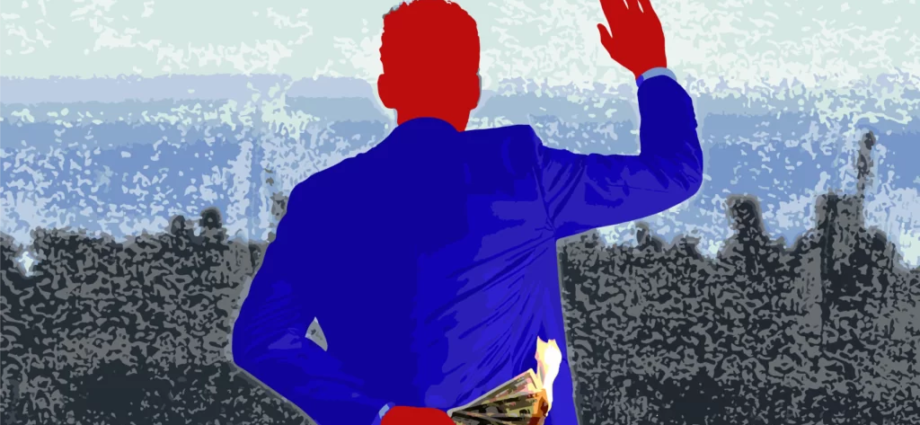
By Ria Ernunsari, Senior Commissioning Editor, 360info Southeast Asia
December 10, 2022
From corruption in public works to whether anti-corruption political movements work, we seek out solutions to this global problem.
Nineteenth century historian Lord Acton said: “Power tends to corrupt. Absolute power corrupts absolutely.” In the twenty-first century, corruption is more complicated. It takes place globally, is multifaceted and affects billions.
From health to education, sport to humanitarian aid, business to social justice, corruption leaves few sectors untouched. It pervades every continent from Europe to Africa, from Asia to Latin America. Corruption by multinationals levels up the corruption game, the global economy making it a borderless crime.
In 2018 the World Economic Forum put corruption’s cost to the global economy at US$3.6 trillion dollars every year. It means the world loses at least five percent of global gross domestic product, according to UN Secretary General Antonio Guterres. Businesses and individuals pay more than US$1 trillion in bribes annually, according to the World Bank.
Corruption also hinders the achievement of Sustainable Development Goals. The UN has urged member states to establish national anti-corruption commissions and prosecutorial efforts. And to help combat it by supporting independent judiciaries, a vibrant civil society, freedom of media and effective whistleblower protections. But in some countries, anti-corruption commissions fail to perform, either because they are pushed by foreign donors that ignore the context of local public service or because the corruptors fight back to weaken the prosecutorial bodies. Researchers try to find other ways to understand and solve corruption.
COVID-19 makes the health sector prone to corruption, especially for low income countries. It is a double threat to them. The urgency to deploy aid tends to ignore the transparency and the accountability of how the funding was spent.
In 2003, the world came together to adopt a landmark agreement – the United Nations Convention against Corruption (UNCAC). Since then, 188 parties have committed to the Convention’s anti-corruption obligations, and every year the UN marks International Anti-Corruption Day on December 9 to commemorate the ratification of the convention. This year’s theme is Uniting the World Against Corruption.

REALITY CHECK
Transparency International found the leaders of five countries shifted US$28-50 billion of public funding to their own pockets between 1965 and 2000. As of 2021, many of the leaders on the list have gone to court for corruption charges, human rights abuses, and other legal issues arising from their abuse of power.
An estimated US$500 billion in public health spending is lost globally to corruption every year. This is a lot more than would be required to achieve universal health coverage.
Surveys carried out by the UN body for education, UNESCO, estimate the salaries of absent or ghost teachers may account for 15-20 percent of payroll costs in some countries; in some cases this is equal to half of the funds allocated to improving school buildings, providing better class equipment and buying school textbooks.
Quantifying the overall losses to corruption in construction is nearly impossible. The very nature of the practice makes it difficult to uncover every instance of corruption and determine its full impact. Estimates range from 10 percent to 30 percent of project cost, and even up to 45 percent in developing economies. Without significant interventions, by 2030 up to US$5 trillion could be lost annually to corruption in construction across the world.
BIG IDEAS
Quote attributable to Nic Cheeseman, University of Birmingham and Caryn Peiffer, University of Bristol, UK:
“It’s important to realise that raising awareness may actually make the problem worse. Before embarking on awareness-raising campaigns policymakers could try and design less problematic messages. One way to do this may be by focusing on those who behave ‘appropriately’, and the negative feelings people hold about those who do not, rather than highlighting the extent of the problem.”
Quote attributable to Charles Simabura and Haykal, Andalas University, Indonesia:
“People demanded reform. Tools were put in place to attack the corruption that had become endemic in public life and was holding back development. But the system is failing. Indonesia’s own parliament, backed by big business interests, has succeeded in weakening the very system set up to fight corruption.”
Quote attributable to Khaled S. Al-Rashidi, Kuwait University:
“People in Kuwait are unaware of the existence of such an Act, or even the real rationale beyond the Act. If people don’t know about it, they’re unlikely to use it. To compound the issue those who are using the Act are using it in a way for which it was not intended.”
Subscribe to our newsletter.
Quote attributable to Janet Ransley, Griffith University, Australia:
“Corrupt acts are hidden, often without direct victims, and often unreported. Investigations tend to be protracted and struggle to produce evidence robust enough for criminal or disciplinary charges. Those suspected of corruption often have the resources to defend themselves in court cases which can take years to finalise.”
Originally published under Creative Commons by 360info™.
Editors Note: In the story “Combatting corruption in democracies” sent at: 05/12/2022 12:08.
This is a corrected repeat.


